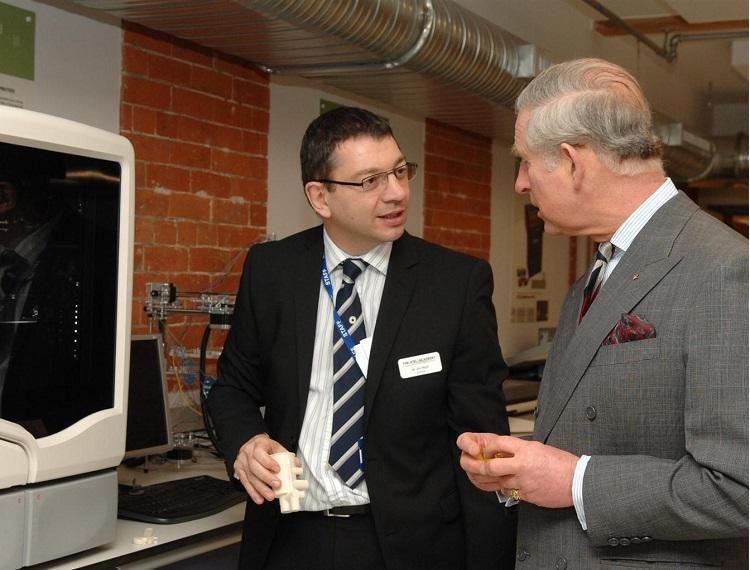Why we need to bring the work place closer

Today the Baker Dearing Educational Trust, the charity that promotes University Technical Colleges (UTCs) has released a report looking at how education fails many students in the real world when it comes to careers in science, technology, engineering and maths (STEM).
As principal of the first UTC, The JCB Academy, I have experienced first hand the benefits strong connections between employers and students represent. So it comes as no surprise to me that nearly (45%) of 20-35 year olds working in STEM careers believe the subjects they studied at school have little value in the world of work, and that a greater number (61%) thought that learning technical skills would have been more useful than studying some of the more traditional academic subjects.
The survey of one thousand young STEM workers found three out of five (60%) reported that they didn’t believe their teachers had a sufficient understanding of the labour market, and a similar number (63%) felt that schools didn’t understand the skills employers needed.
Three out of five of those surveyed (63%) felt employers didn’t have enough say in what schools teach and over half of respondents (55%) also admitted that they didn’t understand how some of the subjects they learnt at school could be used in the world of work.
At JCB Academy we’ve long recognised our students’ innate need to make the connection between what they are learning in the classroom and how they might apply that knowledge in the real world. The enthusiasm and engagement we see regularly, in project work and our employer challenges, tell us we are tapping into something extraordinary.
Recent research by OECD1 suggests more than a quarter of pupils (28%) in England hope to be working in a science-related career by the time they are 30 years old. But the disconnection between what young people are learning in schools and what employers demand of them in the workplace, means we are failing to get it right.
There has recently been criticism of the UTC programme, which are some of the few institutions set up to develop the skills our economy needs. My view is new schools, like new ideas, take time to bed in and this is the case with UTCs. Seven years ago, when I opened the first UTC, I was oblivious to the challenge I was taking on. We were doing something in a completely different way and it is only now that I really comprehend the enormity of the task.
From day one we accepted that we weren’t the right option for every young person. We spent time developing a very clear vision and purpose that could be easily communicated: “developing engineers and business leaders for the future”. And we focused on trying to reach those students who would find this appealing.
Success did not happen overnight, but each year our numbers have steadily increased and in 2014, due to receiving well over 250 applications, we increased our intake from 120 students to 198 students. Ofsted also judged us to be “good” with “outstanding” features and our GCSE results continue to perform well, particularly in maths, where we are well above the national average. Furthermore, our students do not join the ranks of the unemployed; they get a job, stay in full time education, or start an apprenticeship.
There are many factors that have helped us to reach this point, but key has been the shared view of the governors and senior leadership team: that any new product or initiative would take time to become established and take root. Certainly, JCB and our other employer backers understood from experience that it was unrealistic to believe that a completely new concept would immediately achieve all its goals.
Since The JCB Academy opened, the UTC programme has continued to grow and there are now 48. I am aware that for the new openers, unlike me, they are joining a programme that is much more visible. There are benefits to this, but it can also be distracting: for example the recent reports on low student numbers and closure announcements. My advice to the new UTCs is to focus on running the school and ignore the critics. In year one or two it is simply too early to make a judgement about a new school and impossible to draw sensible conclusions.
No one becomes an advocate overnight – it takes time. New students will be excited, parents expectant but they won’t recommend it to their friends and colleagues until they can see it works. Therefore, principals need to focus on teaching and learning, and understand that providing a high quality education is the best marketing message for any school.
The report out today confirms the demand for institutions like UTCs will continue to grow. It also shows young people want to make the connection between school and real life, and they value the subjects that continue to be relevant to them beyond the classroom.
Whilst our education system is so focussed on league tables it is failing to recognise the end goal for students: what they do next. At UTCs young peoples’ futures is central. Last year 44 per cent of students that graduated from UTCs went to university compared to a national figure of 38 per cent, whilst 29 per cent became apprentices, significantly higher than the national average which is 8.4 per cent. The unemployment rate for 18-year-olds is still 11.5 per cent. For graduates of UTCs it is just 0.5 per cent.
UTCs are not the only solution, but the role they play is critical, and we need to accept their place in the education landscape and start supporting them to help realise the untapped potential of those young people wishing to follow a technical career.
Jim Wade, Principal, JCB Academy
1 OECD Programme for International Student Assessment (PISA) 2015 report











Responses